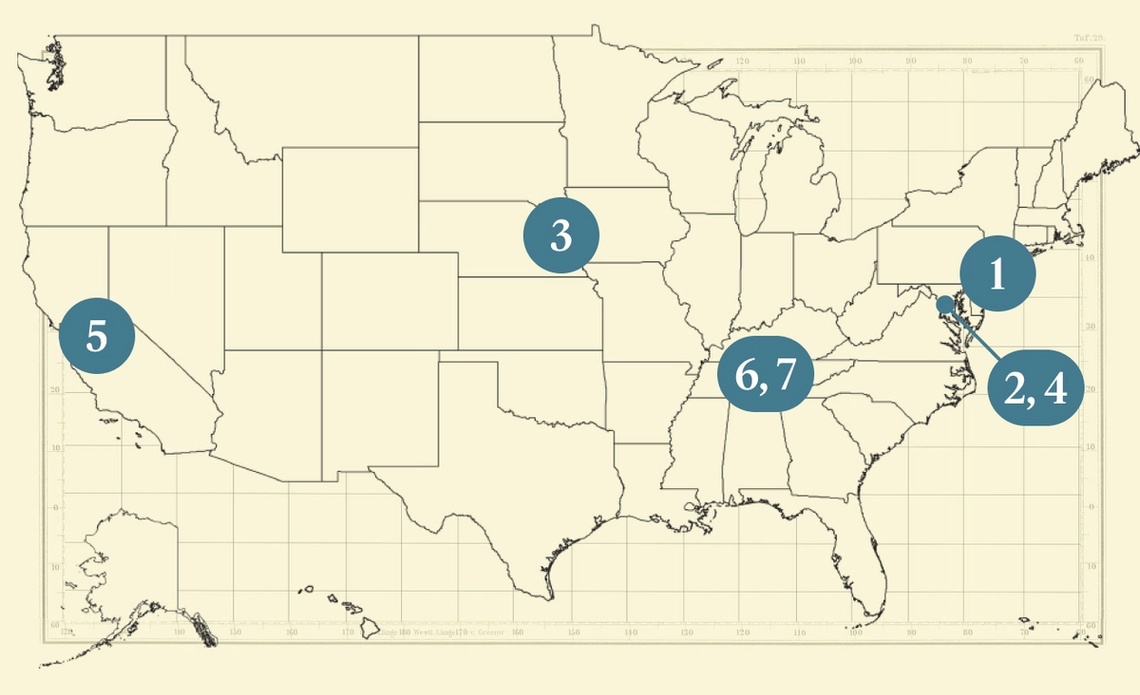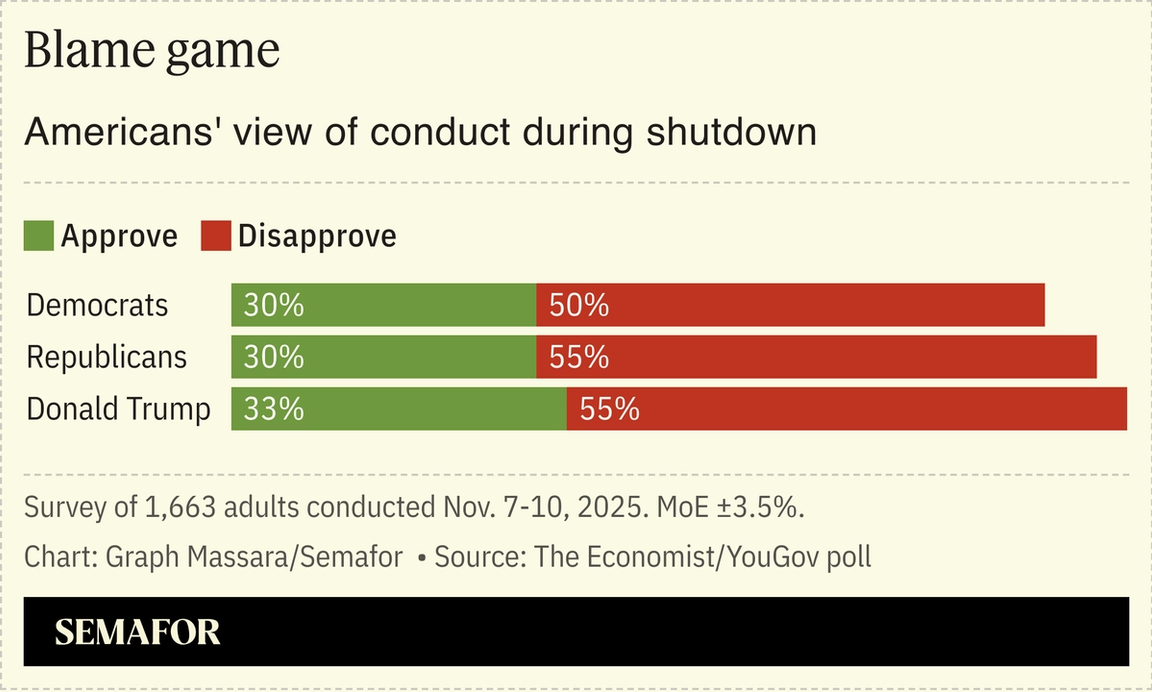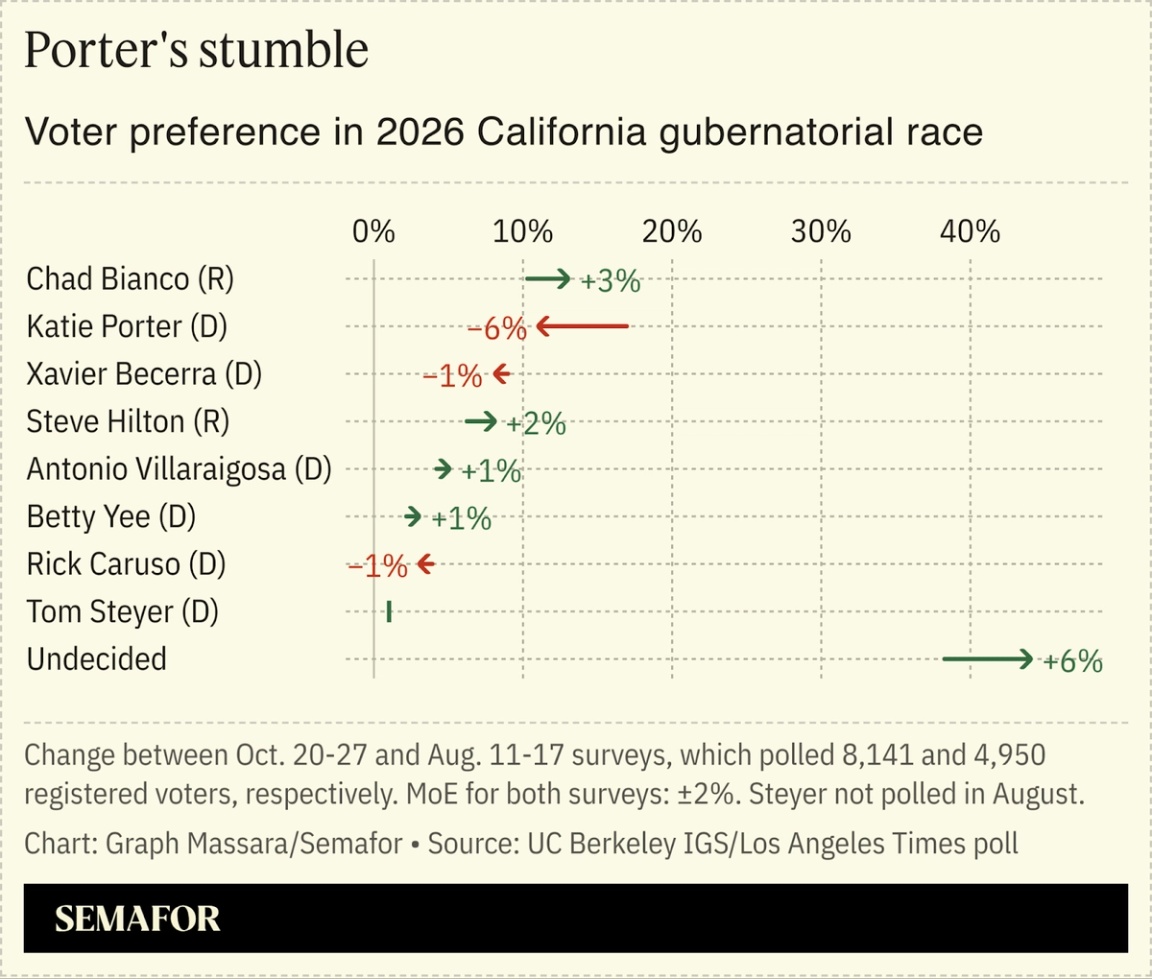| | In today’s edition: a new strategy for Democrats. ͏ ͏ ͏ ͏ ͏ ͏ |
| |   Omaha Omaha |   Washington Washington |   Nashville Nashville |
 | Americana |  |
| |
|
 - Playing Trump’s card
- Democrats’ next challenge
- Folks… he’s back
- Latest shutdown polling
- Twilight for Porter
- Bull market in Tenn.
- The GOP counterpunch
|
|
| |  | David Weigel |
| |
 Kevin Lamarque/Reuters Kevin Lamarque/ReutersWhen now-New Jersey Gov.-elect Mikie Sherrill’s strategists tested her campaign messaging, they saw a major opportunity with a valuable bloc of swing voters: backers of outgoing Democratic Gov. Phil Murphy in 2021 who had moved to Donald Trump’s camp in 2024. Republicans saw potential there for Jack Ciattarelli, their gubernatorial nominee in 2021 and 2025, who embraced the president and dreamed of bringing DOGE to New Jersey. But Democrats’ research showed that none of that was clicking. “There was already this sense that Trump wasn’t doing what he said he was going to do,” said Angela Kuefler, a campaign pollster who has worked with both Sherrill and Virginia Gov.-elect Abigail Spanberger since they entered politics. Swing voters were telling Democrats that “their costs were still really high,” she added. “This isn’t why they voted for him. They were saying: ‘We took a chance on Trump, and it didn’t work.’” The messy end of the government shutdown has darkened Democrats’ moods, just days after their wins in the off-year elections. But those victories have pointed them to a big lesson, one that may work no matter who they nominate. The lesson is this: Not only is it effective to run against the Trump administration in 2025 (and, likely, 2026), but Republicans often make that easier by refusing to put any daylight between their candidates and the president. In both New Jersey and Virginia, Democrats were ready to adjust if GOP nominees criticized Trump’s threats to infrastructure funding or federal worker layoffs. Instead, those Republicans stuck with the White House. Democrats are already applying that lesson in New York, where Republican Rep. Elise Stefanik launched her gubernatorial bid last week. Her campaign video made no mention of Trump, whom she has supported vocally since his first impeachment in 2019. Gov. Kathy Hochul’s campaign, which has hired veterans of the Sherrill race, quickly cut together clips of Stefanik praising Trump, warning that she’d focus on supporting him instead of cutting costs. “Voters don’t think back to what Republicans were before Trump,” said Kuefler. “They now see all Republicans as MAGA Republicans. Jack [Ciattarelli] did a lot of damage to himself. But he was also a victim of where his party had shifted.” Republicans have downplayed Tuesday’s losses as Democratic home games in blue states that had never supported Trump anyway. But Tuesday was the first time that Trump’s party has had to face voters nervous about the economy without him on the ballot. (Even in 2020, voters were more optimistic about Trump leading a pandemic-era comeback than Democrats wanted to believe.) From 2017 through 2019, voters in competitive races largely trusted Trump’s handling of the economy. If they rejected his party, they did so for other reasons — like threats to their health care plans and queasiness about deportations. The economy was his strongest suit. That has changed, even as Republicans insist that it hasn’t. Democrats are getting bolder about the implications of both the reality and the spin.
|
|
What’s at stake for Democrats as they descend into shutdown bitterness |
 Elizabeth Frantz/Reuters Elizabeth Frantz/ReutersDemocrats are still trying to get past their shutdown divisions after eight of their centrist senators struck a deal to reopen the government. Progressives continue to insist that standing their ground would have forced Trump to give in on extending enhanced health insurance subsidies that are set to expire at the end of the year. “We were building momentum to help save our democracy,” wrote Sen. Chris Murphy, D-Conn., who is speaking to Democrats in New Hampshire on Wednesday, as he voted against the agreement. “We could have won — the premium increase notices were just starting. And giving in now will embolden him.” But the party is going to have to figure out a way to regroup, Semafor’s Burgess Everett and I reported. They’ve got a vote on the Obamacare subsidies coming up next month, another shutdown fight in January, House and Senate primaries, and then the midterms. “We can’t push it any faster than it needs to go. People need to sort through what they think about all of this,” said Sen. Brian Schatz, D-Hawaii, who is lined up to be the Democratic whip next year. With the party infighting at a fever pitch as the shutdown deal goes from the Senate to the House, Democrats who backed the deal want to quickly turn the tables on the GOP when the Senate votes on health care. “We’re going to be completely unified, and then the Republicans are going to have their own sense of division,” said Sen. Tim Kaine, D-Va. |
|
Biden returns to Democratic politics, for one night |
 David Weigel/Semafor David Weigel/SemaforJoe Biden returned to Democratic politics on Friday with a speech in Omaha, Nebraska, the first he’s given at a party gathering since leaving the White House. Biden has commented on Trump’s second term in other settings since then, but he made it the focus of his address headlining Nebraska Democrats’ annual fundraiser and meeting, with supporters watching in an overflow room. Nebraska Democratic chair Jane Kleeb said that her party had “broken the seal” on inviting Biden back into the room. The Democrats who saw him in person heard glowing introductions from local labor leaders and praise from Kentucky Gov. Andy Beshear before Biden delivered a denunciation of what Trump has done to the US — while occasionally searching for the right words. “The fact of the matter is, we’re in a situation where we had something special happen just last Tuesday,” said Biden, celebrating the party’s off-year wins. “Remember, when I was running the first time around… I was worried about protecting democracy. I thought it was literally at risk.” He added that he’s still worried, including about Trump holding back money during the shutdown “to feed all those kids” who receive food aid. |
|
Democrats eke out a poll win on handling of shutdown |
 In a year, will voters still remember the shutdown? Recent experience tells us that they won’t. The reopening of the government, expected on Thursday, has competed for airtime with a House effort to require the release of files on the Jeffrey Epstein case. And as the shutdown became the longest in US history, voters mostly stayed in their partisan trenches. But independent voters in this survey were more likely to blame the president and the GOP for the impasse; 52% of them disapproved of how Democrats had handled it, compared to 59% and 60% who disapproved of how Trump and Republicans had, respectively. That’s information Democrats will take into December, when they get another opportunity for a health care vote in the Senate. |
|
 Will Welch is the global director of GQ, and has been the editor-in-chief of its US operation since 2019. On this week’s Mixed Signals, Welch talks to Ben and Max about how the magazine plans to address men amid the prominence of the manosphere, the value in covering niche subcultures, and how the magazine’s parties operate as content creation mechanisms. Welch also talks about how he works with celebrities and praises Robert Pattinson as a more creative collaborator than he’s used to. |
|
Viral video of Porter rocks race for California governor |
 Next summer, if Katie Porter fails to make the top two in California’s all-party gubernatorial primary, everyone will know why. Porter’s brittle interview with a local CBS News reporter, which saw her get stuck on a question about how she could appeal to Trump voters, badly damaged an image that had been in good shape when she left Congress. Porter’s unfavorable rating with independent voters has surged; among Democrats, she’s now viewed less favorably than Xavier Becerra, a former health secretary and state attorney general who hasn’t left a strong impression on voters. Every other Democrat in the field watched that interview and saw an opening. None really benefitted from it, as most of the voters who drifted from Porter became “undecided.” Any other Democratic hopeful has nearly five months left to decide whether to run, but there’s not much demand for Tom Steyer or Rick Caruso, two wealthy Democrats with high name ID. Gov. Gavin Newsom’s team made it known that Steyer’s ads on behalf of a redistricting measure were ineffective. |
|
A Tennessee Democrat’s populist bar game |
 Screenshot/YouTube/Rep. Aftyn Behn Screenshot/YouTube/Rep. Aftyn BehnThe Democratic nominee for a Nashville-area House seat, Aftyn Behn, plays narrator in this paid ad that started running before early voting opened today. The star is the “bull ride” at The Green Light, a popular Nashville bar, which a suit-clad “billionaire” rides easily and a cast of average-looking people get thrown from. Easy mode for Republicans, says Behn, means “tax cuts for billionaires and burying the Epstein files,” while everyone else gets higher premiums. Trump won the gerrymandered district by 22 points last year, but this is a Trump-free version of the messaging Democrats used successfully in every race last week. |
|
Republican leans into anti-‘woke’ message in Tennessee |
 Screenshot/YouTube/Matt Van Epps for Congress Screenshot/YouTube/Matt Van Epps for CongressThe Republican nominee in the Tennessee race, Matt Van Epps, won his nomination easily while Trump endorsed him, and is now using Behn’s social media reach against her. In May, Behn filmed herself and other protesters showing up when ICE was dispatched to Nashville. In her words, the protesters were having a good time “bullying” the agents. That quote plays twice in her opponent’s ad, portraying Behn as so “woke” that she’d undermine and mock law enforcement. In a low-turnout special election, the sort that Republicans have underperformed in all year, the goal is to tell conservatives that it’s worth showing up to reject this person. |
|
|